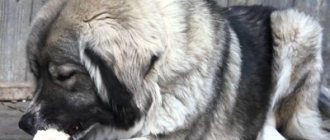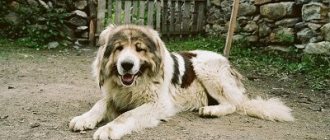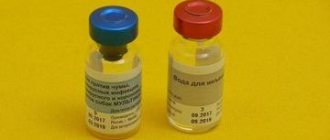The first vaccination for a German Shepherd puppy is given at 8 weeks or upon reaching 2 months of age. First, the puppy receives an anthelmintic, followed by vaccination.
The importance of the first vaccination is great - only with it can he go outside for the first time and go to a new home. Until the baby is vaccinated, he is with his mother in a limited space, without contact with other animals.
Why is primary vaccination so important - the disease enteritis, for which PP is given, is transmitted rapidly, and in a weak, young body it spreads quickly, the baby may die without ever starting his life’s journey.
What are the necessary vaccinations for what diseases?
Vaccination for German Shepherd puppies must be timely, all diseases from which they receive immunity are extremely severe and can cause death. So, before the age of 12 months, the baby will receive immunity from the following diseases:
- Parovirus enteritis can cause an extremely serious condition, the first vaccination.
- Canine Distemper – 2;
- Parainfluenza – 3;
- Hepatitis (infectious) – 4;
- Adenovirus – 5;
- Leptospirosis – 6;
- Rabies – 7;
Preparations for administration, mixed type:
- “Nobivac” - Nobivak;
- “Eurican” – Euriakan;
- “Vanguard” - Vanguard;
- “Canigen” - Kanigen.
Mandatory conditions before vaccination
Vaccination of a German Shepherd, especially for puppies, should only be carried out if there are no health problems. The baby should not be sick, before the first time, they are first given an anthelmintic, and then a vaccine is given 10 - 14 days later.
Preparing your dog for vaccination
The German Shepherd must be properly prepared for vaccination, adhering to the following recommendations from veterinarians:
- the use of special anthelmintic drugs in a timely manner (ten days before vaccination);
- treating the animal against ectoparasites with anti-flea shampoos or drops;
- compliance with the maintenance regime with minimization of walks;
- using a nutritious diet.
During the examination before vaccination, the veterinarian measures the temperature and makes sure that there are no contraindications for vaccination.
Important! It is recommended that older German Shepherds undergo a general urine and blood test before their annual vaccination, which allows the veterinarian to correctly assess the dog’s general health.
Return to content
How to get your first vaccination
- Anthelmintic in 5 - 7 days, if the animal is clean, no worm eggs are found in the feces or they did not come out on their own, PP should be given. If there are parasites, repeated deworming is carried out, and after 7 days PN is given.
- Externally, the baby should be healthy, without snot, active, with good stool. If there is loose stool, the procedure is rescheduled.
- PP is done by the breeder himself, or a doctor is invited. A mark is put in the passport and a sticker is affixed, and the number is written down.
What to do after the injection
If vaccination was carried out in a clinic, and the drug was administered for the first time and is considered a new drug, it is recommended to observe the animal. In some cases, the development of anaphylactic shock is possible (this is extremely rare - a quick and dangerous allergic reaction), therefore it is recommended to use only proven and well-known drugs. In clinics, they preliminarily take an antihistamine (anti-allergy).
For the first time after the procedure, do not bathe the animal; it is not recommended to change the diet.
Monitor the injection site; if there is redness, a large lump, or the injection site becomes hot, seek advice; there may be a complication in the form of an inflammatory process (abscess). If there is a small seal, don’t worry, check it again in a day.
After the procedure, the baby should be active, eat and play. Everything is as usual. If you notice that he is lethargic, does not eat, his nose is dry and hot, measure his temperature; such symptoms should go away within the first 24 hours. If there are no changes, or even a worsening of the condition, contact the clinic.
First vaccination for a puppy (when and how best)
Immediately after birth, pets receive protection from diseases from the mother's breast milk. A shepherd puppy should receive vaccinations from the breeder between 1.5 and 2 months of age. For a fragile puppy, this is serious stress. A weak virus is introduced into the body to strengthen internal forces to fight a possible infection. In essence, vaccination is an easy way to infect your pet. The injection site must be pre-treated with alcohol.
To eliminate possible deviations and maintain the puppy’s health, the following rules must be followed:
- A week before vaccination, it is necessary to start giving your pet antihelminthic drugs such as Pyrantel.
- Before vaccination, it is recommended to make sure that the puppy is healthy and full of energy.
- Check your pet's temperature - it should be no more than 38.5 degrees.
- Vaccinate in the morning before meals.
- Give dietary food on the day of vaccination.
- Avoid bathing your pet after vaccination.
- Provide the animal with care and attention.
Important! If helminths are detected, vaccination is prohibited.
The first vaccination is carried out against parvovirus ethitis and infectious hepatitis, followed by repetition after two weeks.
What complications can there be?
After vaccination, any complications may appear:
- cardiac arrest;
- difficulty breathing;
- heavy salivation;
- change in color of the mucous membrane;
- dyspnea.
The reasons for such deviations are individual intolerance to drugs. A timely visit to the veterinary service will allow the puppy to be treated.
The body after vaccination
After vaccination, the puppy may experience weakness, fever, and lack of appetite. The explanation is simple: the body fights infection with the virus. At temperatures above 39 degrees, it is recommended to use an anal suppository. If negative symptoms persist the day after vaccination, you should contact a veterinary hospital for examination.
Where can I get my first vaccination?
The puppy's vaccinations can be given by the breeder or veterinarian. If the breeder does it himself, then he must indicate all the data in the documents: the drug sticker, the date of administration.
- The vaccination schedule will help you not to miss time and will ensure control over your pet’s health. When the time comes for the next vaccinated person, the owner can vaccinate himself.
Now it has become possible not to take your pet to the clinic, but simply call a veterinarian at home. The animal will not come into contact with sick four-legged animals. The only thing is that the service will not be cheap; the specialist will have to come to your home and also take everything necessary with him, which will require quite a bit of payment.
The best option is to find a clinic in your neighborhood that you can quickly get to. Visit her regularly and choose a specific doctor. Many centers have a cumulative discount system that will help you save money.
Types of vaccines
- Nobivac;
- Biovac;
- Dipentavak;
- Hexadog;
- Multikan, etc.
They have a similar composition and provide the dog with immunity from almost identical lists of infections. When choosing an injection to vaccinate your pet, it is better to consult a veterinarian to find out the pros and cons of the vaccine.
At 4 weeks, the vaccine is given if the puppy needs to be urgently handed over to the owner, or if the puppy’s mother has not been immunized and her offspring have not received the necessary antibodies. In some cases, this drug is used to vaccinate German Shepherd puppies at the age of 2 months.
Nobivac DHPPI+LEPTO is a drug of the next stage of vaccination. It is aimed at creating immunity to leptospirosis, enteritis, adenovirus, hepatitis and parainfluenza type A. For animals over 8 months old, the complex drug Nobivak DHPPI+LEPTO+RABIES can be used, which immunizes the dog against all of the above infections and additionally against Rabies virus ( rabies virus). A properly selected drug and timely immunization are the key to the health and longevity of your pet.
[youtube.player]
Whether routine vaccinations are necessary for your German Shepherd puppy is up to you to decide. There are many opinions on this matter, but most breeders and dog handlers agree that it is not worth leaving the puppy’s fate to the mercy of natural selection. Especially when it comes to your four-legged friend, with whom you are going to spend many long and happy years. Therefore, it is important and necessary to vaccinate shepherd dogs. In order not to get confused in this issue and to do everything correctly, you should familiarize yourself with the basic concepts and requirements of effective vaccinations.
How to vaccinate yourself - at home
All that is needed is knowledge of where to administer the drug, the possible consequences and the vaccine itself. You can always buy it at the pharmacy; it is important to accurately calculate the dosage and administer it completely.
The sticker from the packaging is transferred to the passport, where the date is placed. True, there are medications that should only be administered in veterinary clinics (for example, rabies), but as practice shows, you can do everything yourself, the main thing is that the injection is actually given.
Video instructions on how to vaccinate yourself
Protection with mother's milk when the first vaccinations are given to shepherd dogs
Each German Shepherd puppy, with the first sips of valuable colostrum, and subsequently, during the period of natural feeding, receives immune antibodies from its mother, who has been vaccinated or who has recovered from an infection. So Mother Nature took care of the well-being of her most vulnerable children. This immunity lasts until about 8-9 weeks of life, and then naturally fades away. It is not worth vaccinating puppies before this age, since maternal antibodies will prevent the shepherd dog from developing its own immunity. The first vaccinations for shepherd dogs are given a little later.
Vaccination schedule for a German Shepherd puppy
Until the bitch feeds the puppies, she transfers antibodies along with her milk, provided that the mother is vaccinated. This is why it is so important not to start the vaccination procedure ahead of time. By doing it earlier, you can disrupt the immune system, as a result of which the immune system will be weakened.
There are cases when a bitch cannot feed children on her own (for example, death during childbirth), only in this case the children are vaccinated before the established period of 8 weeks.
Under this condition, a comprehensive vaccination is introduced, designed for an earlier age. Nabivak Pappy - done at the age of 30 days. There are also imported, mixed (polyvalent, several vaccines that can be combined with each other and act simultaneously).
- Duramune Max 5-CvK/4L (duramune puppy);
- Vanguard 7 (Vanguard – Zoetis).
They are allowed to be done at the age of 5 - 7 weeks, but repeated administration will not be twice, but designed for 3 times.
Repeated vaccination
The second vaccination is easier and simpler than the first one. The timing of the next vaccination is in 2.5-3 months. Next, you should repeat the procedure every other year. Many owners use a combination vaccine to protect against a complex of diseases.
The only method to protect the health of your four-legged friend is timely vaccinations. Rabies vaccination is required by law as the disease is a fatal disease in humans. Vaccinations against other diseases can be done according to the schedule and calendar recommended by specialists at the veterinary hospital.
Vaccination table for German Shepherd by age
| The drug "Nobivac" - Nobivak | |||
| Age (weeks) | 4 | 8 | 12 |
| Type of drug | Puppy DP | DHPPi+ Lepto | DHPPi + Lepto and Rabies |
| "Vanguard" - Vanguard | |||
| Age (weeks) | 5 | 8 | 12 |
| Type of drug | Vanguard DA2Pi + CPV-L | Vanguard DA2Pi + CPV-L | Vanguard DA2Pi + CPV-L + Nobivac R or Rabizin |
| "Duramune puppy" - Duramune | |||
| Age (weeks) | 6 | 9 | 12 |
| Type of drug | Duramune Max 5-CvK/4L | Duramune Max 5-CvK/4L | Duramune Max 5-CvK/4L + Nobivac R or Rabizin |
Classic (regular) scheme
| Age (weeks) | "Canigen" - Kanigen | "Nobivac" - Nobivak |
| 8 | DHA2PPi+L | DHPPi + Lepto |
| 12 | DHA2PPi + LR | DHPPi + Lepto + Rabies or DHPPi + LR |
Many vaccines require repeated administration after the first time, again after 2 - 3 weeks. Rabies testing is performed upon reaching 3 months of age.
After repeated administration, after 12 weeks, immunity is formed for 1 year. In subsequent years, it is done exactly after 12 months.
According to the schedule, the sequence looks like: 2 months, 3 months and 15.
Depending on the specific brand and manufacturer, there is a different period of time for the formation of immunity.
- “Duramune puppy”, “Vanguard” (Duramune pappy Vanguard) 21 days;
- “Nobivac” Nobivac – 10 days;
- “Eurican” – Euriakan – 2 weeks;
As soon as the established period has passed, you can safely contact other animals and walk in public places with other animals. If the re-introduction period is missed, you will have to repeat the process again, but for adults it should be done as soon as possible once.
Types of vaccines and diseases
Currently, a pet can be vaccinated with domestic and foreign drugs, which differ not only in price, but also, as a rule, in basic quality characteristics. Depending on the purpose, the following types of vaccines differ:
- weakened live or attenuated vaccines - the composition of such preparations is characterized by the presence of viable strains of pathogenic pathogens that have a reduced ability to affect the animal’s body. These types of vaccines include Bivirovax and Multikan;
- killed or inactivated vaccines - this type of preparation is made on the basis of microorganisms that have died under chemical or physical influence. Such vaccines include Vakderm and Trivirokan;
- vaccines of chemical origin - obtained in the process of purifying antigens of pathogens from negative components by chemical and physical methods;
- toxoids or toxoid vaccines - manufactured using various toxic components that have previously undergone disinfection. These vaccines include all tetanus shots, as well as anti-botulism vaccines.
Depending on the composition and basic properties, the following classification of vaccines is used:
- complex-type preparations or polyvaccines, which contain several components at once that are responsible for the formation of immunity against a specific infection;
- divaccines or dual-action drugs that form reliable immune protection against a pair of pathogens;
- homologous preparations produced from materials that are obtained from a similar animal species and are characterized by the absence of foreign proteins;
- monovaccines containing a pathogen antigen against one specific infectious disease;
- polyvalent drugs used simultaneously against several types of pathogens that cause a specific infectious disease.
Popular vaccines for German Shepherd:
- Nobivac-DN – plague and hepatitis;
- Nobivac-DNR – plague, hepatitis and parvovirus infection;
- Nobivac-DNPPi – plague, hepatitis, parvovirus infection and parainfluenza;
- Nobivac-L – leptospirosis;
- Nobivac-LR – leptospirosis and rabies;
- Nobivac Pyrry-DP – plague and enteritis;
- Nobivac Parvo-C – parvovirus infection;
- Nobivac Rabies – rabies;
- Trivirovax – plague, hepatitis, parvovirus infection and adenovirosis;
- Tetradog – leptospirosis, plague, hepatitis, parvovirus infection and adenovirosis;
- Nehadog – rabies, leptospirosis, plague, hepatitis, parvovirus infection and adenovirosis;
- Leptodog – leptospirosis;
- Letorabishin – leptospirosis and rabies;
- “Vangard-CPV” – parvovirus infection;
- “Vangard-5/L” – plague, hepatitis, adenovirus, parainfluenza and parvovirus, leptospirosis;
- “Vangard-7” – plague, infectious hepatitis, adenovirus, parainfluenza and parvovirus, leptospirosis;
- “Defensor” – rabies;
- Duramune Max-5-CvK/4L – plague, adenovirosis, parvovirus and coronavirus infections, leptospirosis and parainfluenza;
- Duramune Max-5-CvK – plague, adenovirosis, parvovirus and coronavirus infections, parainfluenza;
- Duramune Max-5/4L – plague, adenovirosis and parvovirus infections, leptospirosis, parainfluenza;
- Duramune Max-5 – plague, adenovirus and parvovirus infections, parainfluenza;
- Duramune Purpyshot Booster Lyme – plague, adenoviral and parvovirus, coronavirus infections, parainfluenza, leptospirosis and borelliosis;
- Duramune-L – leptospirosis;
- Вronchi-Shield-III – adenovirosis, parainfluenza and bordetheliosis;
- Lyme Vax – boreliosis;
- Duramune Pyrryshot Booster – plague, adenovirosis, parvovirus and coronavirus infections, parainfluenza and leptospirosis;
- Duramune Pyrryshot – plague, adenovirosis, parvovirus and coronavirus infections, parainfluenza;
- Duramune DA2LP+Pv – plague, adenovirosis and parvovirus infections, parainfluenza and leptospirosis;
- Duramune DA2P+Pv – plague, adenovirosis and parvovirus infections, parainfluenza and leptospirosis;
- "Biovac-D" - plague;
- "Biovac-L" - leptospirosis;
- “Biovac-RA” – enteritis, hepatitis and adenovirosis;
- “Biovac-DRA” – plague, parvovirus enteritis, hepatitis and adenovirosis;
- “Biovac-DRAL” – plague, parvovirus and hepatitis, adenovirosis and leptospirosis.
- "Vakderm" - dermatophytoses.
Vaccines can be presented by inhalation aerosols, intravenous, subcutaneous and intramuscular preparations, intranasal and conjunctival agents. Skin and oral vaccines are sometimes used.
Return to content
Vaccination schedule
A simplified table will help the owner vaccinate a German Shepherd by age:
| Name of the disease | First vaccination (age in weeks) | Second vaccination | Revaccination | Repetition |
| Parvovirus infection | 8-10 | in 21 days | 1 year | annually |
| Plague | 8-10 | in 21 days | 1 year | annually |
| Infectious hepatitis | 8-10 | in 21 days | 1 year | annually |
| Leptospirosis | 8-10 | in 21 days | 14-16 months | |
| Rabies | 12 | 1 year | annually |
Owners of German Shepherds should understand that after the procedure the dog may be less active. For about a day, your pet’s nose will be dry and warm, and the temperature may rise. If on the second day the dog has not returned to its usual state, you should consult a veterinarian.
For two weeks, the pet’s immunity will be weakened, so it is advisable to observe quarantine and refrain from walking.
Vaccination, carried out according to the vaccination calendar, guarantees the protection of the shepherd dog from deadly viruses and infections. This will increase the dog’s immunity, improve its health, and also stop the spread of dangerous diseases that are transmitted from animals to humans.
Do you get all your pet's vaccinations?
General principles and rules
All dogs are vaccinated according to the same schedule, so the vaccination schedule for German Shepherds follows the general rules.
- Vaccination is carried out only on healthy animals. Any illness is accompanied by a decrease in immunity necessary to fight viruses. Administration of a vaccine to a sick dog can result in complications or death.
- Vaccinations are considered mandatory for dogs planning to have offspring. To obtain healthy puppies, your pet is vaccinated no later than 2 months before mating.
- The vaccination calendar is compiled individually and depends on the chosen vaccine.
- The optimal time for grafting is summer and winter. High and low temperatures are destructive for viruses, therefore they exclude a negative reaction to the administered drug.
IMPORTANT! If a German Shepherd puppy has started to lose its baby teeth, it is not recommended to vaccinate it. This process negatively affects the immune system.
After vaccination, the owner receives a dog passport with the date of vaccination and the name of the administered drug.
Age and schedule
The veterinarian draws up an immunization schedule for the puppy, taking into account the age and mandatory dates when basic vaccinations need to be completed. The first vaccination is carried out from 2 to 6 weeks with the Parvovac vaccine. It works against enteritis - parvovirus and coronavirus. The repeat is done at 8, 12 and 16 weeks.
You can use the complex drug "Triovak". It is designed to fight against three infections:
- hepatitis;
- enteritis;
- adenovirus.
The table shows the types of vaccinations and timing:
| Vaccines | First vaccination | Second vaccination | Revaccination | Methods of administration |
| Against coronavirus enteritis | 2–2.5 months | After 21–28 days | At 12 months, then 1 injection annually | IM, s/c |
| For parvovirus enteritis | 2–2.5 months | After 21–28 days | Every 12 months, subsequent years - once every 12 months | IM, s/c |
| Against plague | 2.5 months | After 21–28 days | At 12 months, then once a year | IM, s/c |
| Against rabies | Done after distemper, at 8 months and later | – | At 12 months, then once a year | IM, s/c |
| From adenovirus and leptospirosis | After 4 months | After 21–28 days | At 12 months, then once a year | IM, s/c |
The vaccine should not be administered during the period when baby teeth are changing, as puppies are most vulnerable during this period. This is fraught with serious health problems.
The most favorable period for vaccination against distemper is 2.5 months; earlier it makes no sense, and later it is dangerous. The Vakchum, 668-KF and EPM vaccines are used. Anti-rabies vaccine phenol is used against rabies.
Polyvalent vaccines are the most popular.











